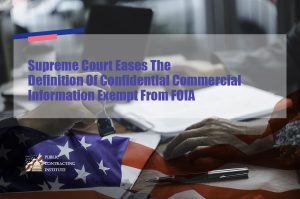The Freedom of Information Act (5 USC 552, or “FOIA”) requires that upon request, an agency shall “shall make [] records promptly available to any person.” However, there are nine exemptions under which an agency may deny the requested records, as follows: (All are in section (b) of the FOIA).
- (1) specifically authorized under criteria established by an Executive order to be kept secret in the interest of national defense or foreign policy;
- (2) related solely to the internal personnel rules and practices of an agency;
- (3) specifically exempted from disclosure by statute (other than section 552b of this title), if that statute;
- (4) trade secrets and commercial or financial information obtained from a person and privileged or confidential;
- (5) inter-agency or intra-agency memorandums or letters that would not be available by law to a party other than an agency in litigation with the agency;
- (6) personnel and medical files and similar files the disclosure of which would constitute a clearly unwarranted invasion of personal privacy;
- (7) records or information compiled for law enforcement purposes [with further explanation];
- (8) contained in or related to examination, operating, or condition reports prepared by, on behalf of, or for the use of an agency responsible for the regulation or supervision of financial institutions; or
- (9) geological and geophysical information and data, including maps, concerning wells.

The Supreme Court recently considered exemption at 5 USC 552 (b)(4), Confidential commercial information, and narrowed the basis on which an agency may withhold information. Food Marketing Institute v. Argus Leader Media, No 18-481, (U.S. Sup. Ct. June 24, 2019).
Previously, most courts had held that contractors must show that the disclosure of the information would cause “substantial competitive harm.” See Nat’l Parks & Cons. Assn. v. Morton, 498 F. 2d 765, 770 (DC Cir. 1974). Food Marketing rejected this test, indicating that the statutory language could not support the requirement for a competitive harm determination. The Court reviewed the plain meaning of the term “confidential” and found two potential conditions:
(1) information customarily kept private or at least closely held; and (2) information disclosed when the receiving party provides some assurance that it will remain secret. The Court concluded that Exemption 4 imposed no showing of “harm” whatsoever.
The definition that the Supreme Court endorsed is substantially broader, and much easier for a government contractor to meet than the “substantial competitive harm” test previously used in Nat’l Parks.
The Takeaway. If a government contractor can establish that the information it provides to the government is customarily kept private or at least closely held, and there is some assurance that the government will keep that information secret, then the contractor (and the agency) will be able to withhold that information in response to a FOIA request for it.
For other helpful suggestions on government contracting, visit:
Richard D. Lieberman’s FAR Consulting at https://www.richarddlieberman.com/, and Mistakes in Government Contracting at https://richarddlieberman.wixsite.com/mistakes.
